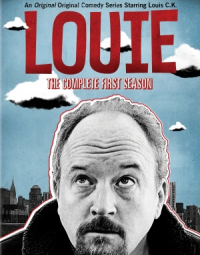“Louie” follows the misadventures of a divorced stand-up comedian in NYC. (Photo courtesy of Movieposterdb)
There is something ironic in seeing Louis C.K. listed as writer, director, editor, scorer and star of his own Emmy-winning television show, “Louie.” Given his dream of having control over his show, the credits are an overbearing sort of chest beating by Louie to show how liberating it is to do whatever he feels like on television. Such freedom is a hallmark of American entertainment, American consumerism and American life. But, “Louie” shows — just as many of his realist contemporaries have shown — freedom can be just as destructive as it can be empowering.
Sure, C.K. remains unafraid to tell his jokes through disarmingly bizarre and darkly humorous situations with his existence as the punchline, and, given Louie’s acute perception of human emotion and his ability to capture such moments through brilliant directing, scoring and casting, he pieces together some of the most inspired and inspiring moments in all of television. C.K.’s writing (sometimes awkward, always jarringly natural), setting (usually New York City) and music (always, always, always jazz) are clearly the constructive outputs of Louis C.K.’s story-writing abilities. They are, after all, what make Louie’s adventures so curiously artful.
But, when someone mentions how “Louie” is so funny, hilarious, honest, etc., I cannot help but think that this individual does not really get “Louie.” For “Louie,” there is no joke to get. In “Louie,” there is only Louie’s reality and his struggle to cope with how sad his reality can be. If it is even remotely a joke, it is a cruel joke the show plays on its own protagonist. It is Louie’s struggle with the absurdities of reality; that is the show’s take-away.
Louie’s character (whose experiences draw from those of the real-life Louis C.K., a successful stand-up comedian) is ultimately trying to find satisfaction in a society he finds repulsive due to its synthetic purposelessness and its manufactured emotion. But, in his disapproval, he finds that this repulsion inversely leads to people disdaining him, repulsed by his indulgent lifestyle and his abhorrent apathy. The results are quietly Holden Caulfield-esque: Louie, when he does love someone, clings to that person so tightly that he or she ends up going away, and all that is left is a cloudy memory. Such is the case with Pamela, a mother at Louie’s daughter’s school. Louie meets Pam in the beginning of season two, confesses his love to her in episode six, and in the final seconds of the season she says her last good-bye to Louie before flying off to Paris. This scene is the most heartbreaking of the series. When Louie finally wants to make something his own, it is hard to see it all crumble before his eyes with just one piece to pick up: himself.
This isolation Louie constantly faces leaves him vulnerable to self-doubt, self-pity and, most grotesquely, self-stimulation. This solitude is indicative of his alienation from the people in his life, be it from fellow comics, close friends, females in the dating world or the whole of New York City. It is worth nothing that this does not go without overwhelming moments of redemption, which remind Louie of what really matters in his life: raising his two adorable daughters, Lilly, a nine-year-old, and Jane, a six-year-old.
There are a million and a half things on which to elaborate, but doing so would not come close to giving “Louie” its due. Stunning directing, spirited guest stars, 20-minute-long fart jokes and blatant jabs at network television abound in every episode and, given the few elements of continuity in the show, “Louie” shifts and rearranges constantly to appropriate any and every goofy idea it can fit in 22 minutes. The only constant it needs is Louie, a single father living in alienation from society, making sense of the paradoxical absurdities that consume American life and all of the freedom we believe freedom gives us.





